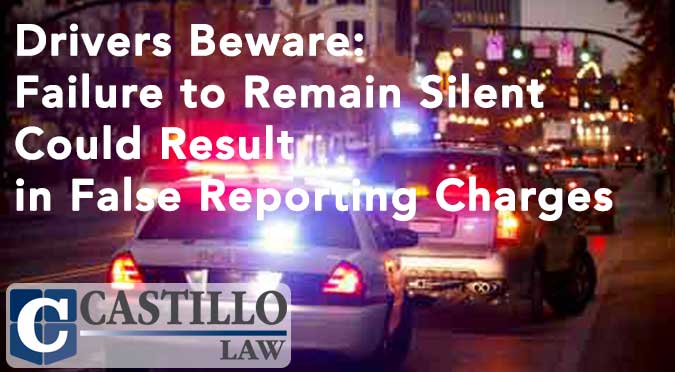Right to remain silent: Use It!
Drivers Beware: Here is yet another reason why you should only provide your driver’s license, registration, and insurance, and nothing more. If you are stopped by an officer conducting a traffic stop and you have been drinking, do not make any statements. Your words will be used against you.
An East Valley prosecuting agency and False Reporting
A new practice is on the rise by at least one East Valley City Prosecutor’s office. This office believes that if you are charged with DUI, and during the investigation you tell an officer that you only had “two drinks” or “a few beers,” but your blood alcohol concentration later supports you had much more, you are technically giving false information and may be charged with false reporting.
Examples of Potential False Reporting
Imagine the potential ramifications and flood gates this practice opens for drivers on our roadways:
Officer: Sir, how fast were you going?
You: Officer, I was only going 55.
The officer’s radar shows you were going 75. You receive a criminal speeding ticket and have to appear in court and meet with a prosecutor. At least in this particular East Valley City, using this rationale, a prosecutor could add the charge of false reporting, even if you firmly believed you were only going 55.
Or, consider this scenario during the investigation of a traffic accident:
Officer: Tell me what happened?
You: Officer, I know I had the green light.
Witness statements from other cars provide a different account. Your statement now provides a basis for false reporting.
Or, in a more common example:
Officer: Excuse me; do you know why I stopped you?
You: No Officer. I know I came to a complete stop and followed all traffic laws.
The officer’s dash cam shows you did not completely stop at the stop sign. Again, using this prosecuting agency’s rationale, your statement could result in false reporting charges.
In most of these cases, there was no interference with the operation of a law enforcement agency.
However, because this is not a jury eligible offense, you are not eligible to have a jury determine your guilt. A judge will determine whether or not your statement meets the elements of false reporting. As you can see, even in very innocent situations, where you legitimately believe your statement is true, it does not pay to speak with police, if you are under investigation. Remain silent.

